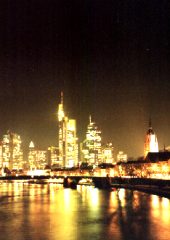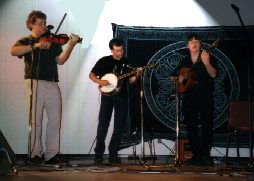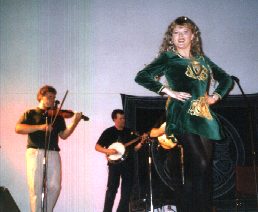FolkWorld article by Christian Moll:
The Continental Celts series, Part IV
Giant Gaels in Germany
Gaelfest 2000 - the biggest summer school in Central Europe so far
 Gaelfest 2000 took place in early summer, as first edition of hopefully many more - at least the second Gaelfest is already in preparation. Having quite a special character, Gaelfest combines workshops, céilí and concert. It is organised by some Irish people living in Germany together with some Germans with great affinity to the Irish culture.
Gaelfest 2000 took place in early summer, as first edition of hopefully many more - at least the second Gaelfest is already in preparation. Having quite a special character, Gaelfest combines workshops, céilí and concert. It is organised by some Irish people living in Germany together with some Germans with great affinity to the Irish culture.
A short flashback on this year's Gaelfest. On the first evening a concert took place with 24 dancers and musicians, including Irish step dancers, uilleann pipers of the DUPG (which is the German branch of Na Píairí Uillinn), several German and Irish soloists and bands (one of the bands being only formed to take part at this event). The "Monster Céilí" with the "Templehouse Céilí Band" (Dublin) attracted about 150 dancers.
Still, the most special thing were the workshops. In the altogether 11 different workshops you could learn to play whistle (beg), flute (adv), fiddle (beg, adv), accordion, banjo, bodhrán, guitar accompaniment, but also step-dance (adv), set-dance and even Irish language. Teachers included Mick Mulkerrin (set-dance), Seamus Meehan (accordion) and Mary Corcoran (fiddle). About 120 participants took part at the biggest summer school in Central
Europe so far!
Rolf Wagels, bodhrán player in diverse high quality German Irish bands, was one of the teachers. Says he, "I was asked to do the bodhrán workshop and I felt it was an honour. The people of the association did their best to make it a pleasant weekend, full of learning and playing."
The workshops (and many other things) took place in a youth hostel (the 'Haus der Jugend' in the heart of Frankfurt city, near the river). Rolf was in the beginning not convinced if that would be a good idea: "At first I thought
the venue might not be too good, since it was a big youth hostel; and the normal hostelling business should go on during the event. But then it worked out to be brilliant: You stayed with all participants all the time, shared
a table with them for breakfast. If you were up that early of course", he adds with a smile.
 This event provides a big opportunity for the German Irish folk and trad scene - it is getting now much easier to get involved in the Irish music scene then some years ago.
The participants liked in particular that you have with the Gaelfest Ireland in Germany for a weekend. Says Evelyn Hoffmann who took part in the advanced step-dancing workshop: "The Gaelfest is great, it is like having a small part of Ireland in Germany! For me this weekend was like being in Ireland, the atmosphere was excellent." Bernhart Tischler, an Austrian from Vienna (adv. flute) adds; "A trip to Ireland was too expensive for me this year - but I wanted to have the craic of Irish music, so I went to Frankfurt. And it happened; having only travelled one third of the long journey to Ireland, the taste of Ireland was nevertheless there..."
This event provides a big opportunity for the German Irish folk and trad scene - it is getting now much easier to get involved in the Irish music scene then some years ago.
The participants liked in particular that you have with the Gaelfest Ireland in Germany for a weekend. Says Evelyn Hoffmann who took part in the advanced step-dancing workshop: "The Gaelfest is great, it is like having a small part of Ireland in Germany! For me this weekend was like being in Ireland, the atmosphere was excellent." Bernhart Tischler, an Austrian from Vienna (adv. flute) adds; "A trip to Ireland was too expensive for me this year - but I wanted to have the craic of Irish music, so I went to Frankfurt. And it happened; having only travelled one third of the long journey to Ireland, the taste of Ireland was nevertheless there..."
Gaelfest 2000 has grown organically from the shared concept, enthusiasm and hard work of several key players in the Rhine-Main area. Says Stiofán Ó Foghlú, President of the Rhine-Main German-Irish Association: "I never intended to be the 'Paddy away from home' when I first came here in 1998. In fact, I wanted to integrate into society here, to learn the language and appreciate the culture. It was only a series of chance encounters that brought me into contact with several people closely associated with the Irish cultural scene here in Rhine-Main. I was amazed to discover such a high level of awareness and participation in Irish cultural activities. I had no idea that there were so many locals and ex-pats involved in "céilithe" - Irish dancing evenings - dance and music workshops, and Irish trad and folk music sessions. I even met Irish-speaking Germans! It seemed to me though that most of the groups tended to be very vertical, to borrow the business term; very competent and specialised in one or two areas of the culture, but with little integration into the broader picture. That's when the idea of an interfacing group to grow all these together into something bigger than the sum of the parts hit me."
A group of like-minded individuals met just before Christmas 1999. Says
Stiofán Ó Foghlú, "All were committed to putting on a top-class weekend
of music, dance and "craic" in Frankfurt. Since then the group has
expanded."
In early 2000 a new organisation, the "Deutsch-Irische Gesellschaft Rhein-
Main - RMGIA" (Rhine-Main German-Irish Association) was founded by
Frankfurt-based Irish and Germans with a great interest in Irish culture.
The Germans come from the Rhine-Main area and the Irish from Donegal,
Galway, Limerick and Cork - so the RMGIA is a real culchie club! Stiofán Ó Foghlú from Cork became President, Marcus Metz from Nauheim (near Frankfurt) vice-president. The first event organised by this new association was the "Gaelfest 2000".
 The organisation of the whole weekend meant really hard labour but also
great fun for them. Marcus Metz, Vice-President of the RMGIA says "I
wonder why the Frankfurt detectives didn't cast suspicion on us - a
bunch of fellows meeting in the railway station, carrying hundreds of
green brochures and speaking a strange language (Gaeilge!)..."
The organisation of the whole weekend meant really hard labour but also
great fun for them. Marcus Metz, Vice-President of the RMGIA says "I
wonder why the Frankfurt detectives didn't cast suspicion on us - a
bunch of fellows meeting in the railway station, carrying hundreds of
green brochures and speaking a strange language (Gaeilge!)..."
In Marcus' opinion the special thing about Gaelfest is that "Gaelfest 2000 has really reflected the Irish cultural scene in Germany today. We got
highly respected artists from Ireland performing and teaching, but there's
also been a bunch of Germany's traditional musicians taking part in the
concerts and workshops - as tutors and participants."
This kind of event strengthens the already strong connections between Germans and Irish culture, especially Irish music. But are Germans predestined to play Irish music? Says Marcus "No, I don't think so. But some Germans have a certain affinity. That affinity exists in other countries as well, I would name the Netherlands, Switzerland, Spain or Japan. In the last 30 years Irish artists had a big success in Germany, but nowadays I see that a German Irish "trad scene" arises. Some of the listeners became musicians or dancers. It seems that the old tree got a new branch and that branch grows here."
The participants were mostly Germans from all over Germany, some ex-pats living in Europe, and some people from Austria, France, Belgium and Ireland.
Rolf Wagels likes the intercultural feeling of the event "It was a good
intercultural event with people from Germany, France, Switzerland and
Austria coming to learn Irish culture. Even some Irish people were in the
courses led by Germans, learning to play Irish music !!"
Even the German Irish language teacher had four people from Ireland learning "An Gaeilge".
Gaelfest 2000 got media attention already in advance - three major German radio stations and a regional TV station presented interviews about it, and even in Ireland you could hear about it, with interviews on Raidió na Gaeltachta and BBC Northern Ireland.
At the moment, Gaelfest 2001 is in preparation, and they are still looking for a major sponsor for this big event. If you want to become a sponsor, please contact Marcus Metz, e-mail: metz@digrm.de.
You can find more information about the next festival and general
information about the Rhine-Main German-Irish Association on their
(bilangual) homepage.
Photo Credit: (1) Frankfurt, by Marcus Metz; (2, 3) Gaelfest, by Andreas Moll
The Continental Celts is an irregular FolkWorld series, presenting regularly the best of Irish folk on the European continent. Having featured already Shantalla and Orion, both from Belgium, and Drones & Bellows from Denmark, this article is the first one focussing on an event. Next issue we stay in Germany, introducing one of its best new representants of "Continental Celts".
Back to the content of FolkWorld Articles, Live Reviews & Columns
To the content of FolkWorld online magazine Nr. 16
© The Mollis - Editors of FolkWorld; Published 10/2000
All material published in FolkWorld is © The Author via FolkWorld. Storage for private use is allowed and welcome. Reviews and extracts of up to 200 words may be freely quoted and reproduced, if source and author are acknowledged. For any other reproduction please ask the Editors for permission.
FolkWorld - Home of European Music

Layout & Idea of FolkWorld © The Mollis - Editors of FolkWorld
 Gaelfest 2000 took place in early summer, as first edition of hopefully many more - at least the second Gaelfest is already in preparation. Having quite a special character, Gaelfest combines workshops, céilí and concert. It is organised by some Irish people living in Germany together with some Germans with great affinity to the Irish culture.
Gaelfest 2000 took place in early summer, as first edition of hopefully many more - at least the second Gaelfest is already in preparation. Having quite a special character, Gaelfest combines workshops, céilí and concert. It is organised by some Irish people living in Germany together with some Germans with great affinity to the Irish culture.
 This event provides a big opportunity for the German Irish folk and trad scene - it is getting now much easier to get involved in the Irish music scene then some years ago.
The participants liked in particular that you have with the Gaelfest Ireland in Germany for a weekend. Says Evelyn Hoffmann who took part in the advanced step-dancing workshop: "The Gaelfest is great, it is like having a small part of Ireland in Germany! For me this weekend was like being in Ireland, the atmosphere was excellent." Bernhart Tischler, an Austrian from Vienna (adv. flute) adds; "A trip to Ireland was too expensive for me this year - but I wanted to have the craic of Irish music, so I went to Frankfurt. And it happened; having only travelled one third of the long journey to Ireland, the taste of Ireland was nevertheless there..."
This event provides a big opportunity for the German Irish folk and trad scene - it is getting now much easier to get involved in the Irish music scene then some years ago.
The participants liked in particular that you have with the Gaelfest Ireland in Germany for a weekend. Says Evelyn Hoffmann who took part in the advanced step-dancing workshop: "The Gaelfest is great, it is like having a small part of Ireland in Germany! For me this weekend was like being in Ireland, the atmosphere was excellent." Bernhart Tischler, an Austrian from Vienna (adv. flute) adds; "A trip to Ireland was too expensive for me this year - but I wanted to have the craic of Irish music, so I went to Frankfurt. And it happened; having only travelled one third of the long journey to Ireland, the taste of Ireland was nevertheless there..."
 The organisation of the whole weekend meant really hard labour but also
great fun for them. Marcus Metz, Vice-President of the RMGIA says "I
wonder why the Frankfurt detectives didn't cast suspicion on us - a
bunch of fellows meeting in the railway station, carrying hundreds of
green brochures and speaking a strange language (Gaeilge!)..."
The organisation of the whole weekend meant really hard labour but also
great fun for them. Marcus Metz, Vice-President of the RMGIA says "I
wonder why the Frankfurt detectives didn't cast suspicion on us - a
bunch of fellows meeting in the railway station, carrying hundreds of
green brochures and speaking a strange language (Gaeilge!)..."
